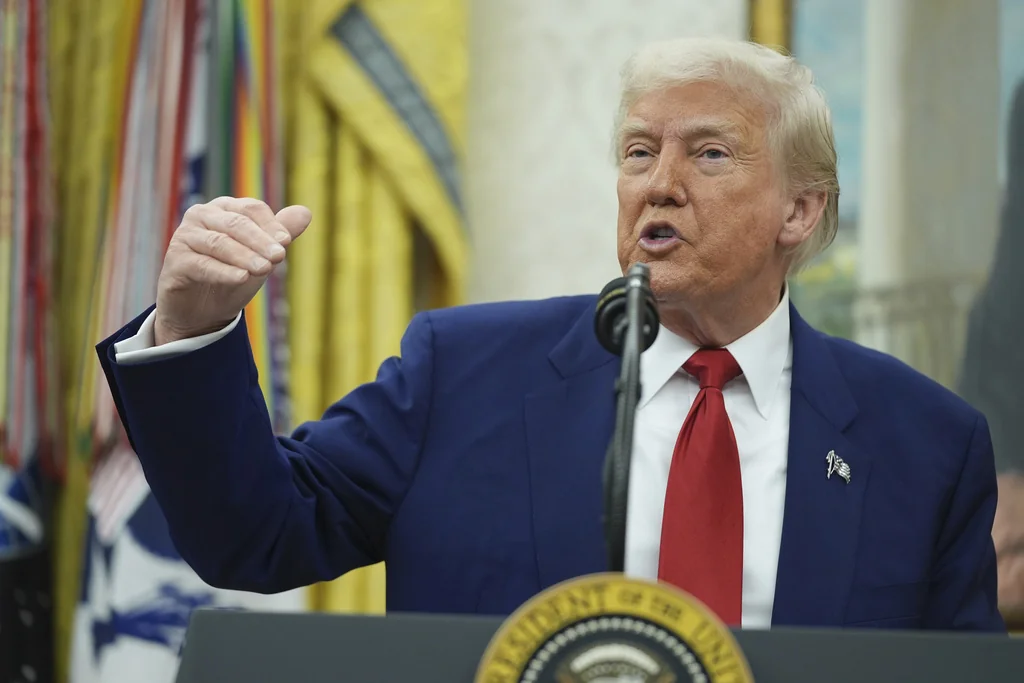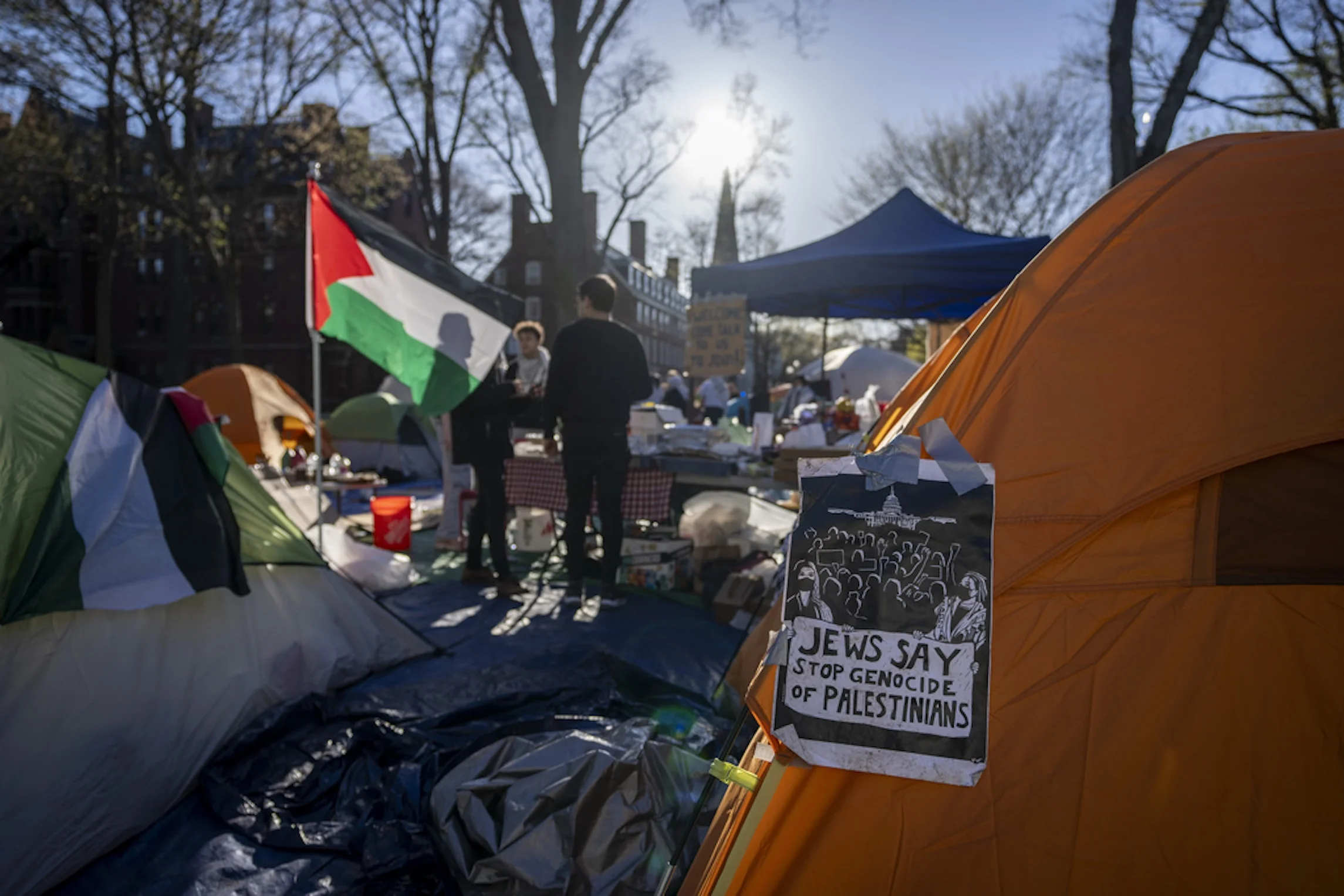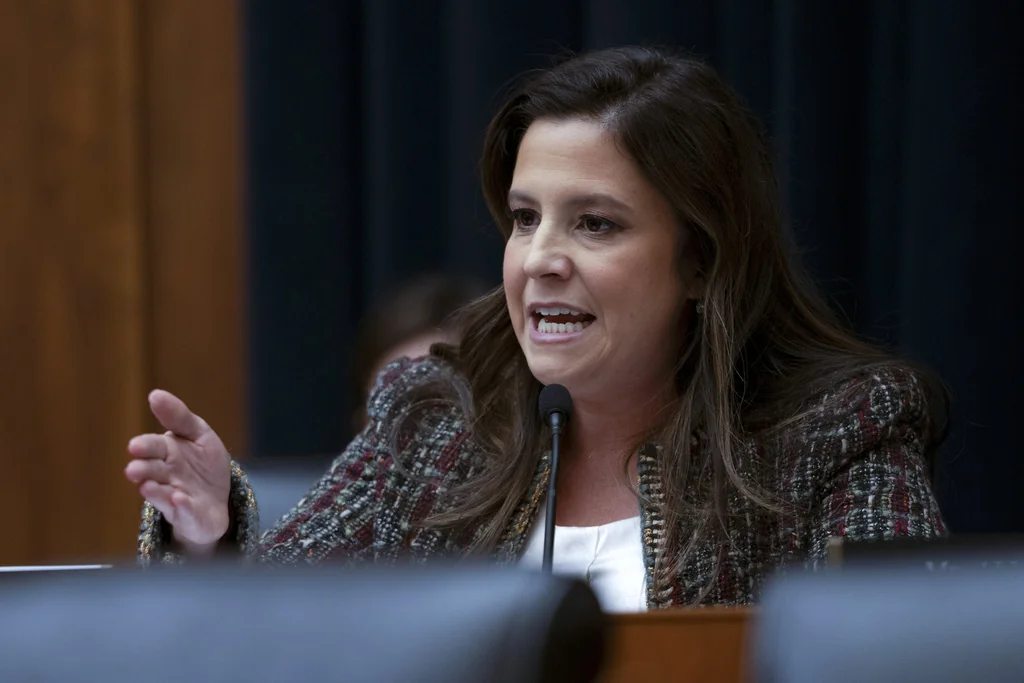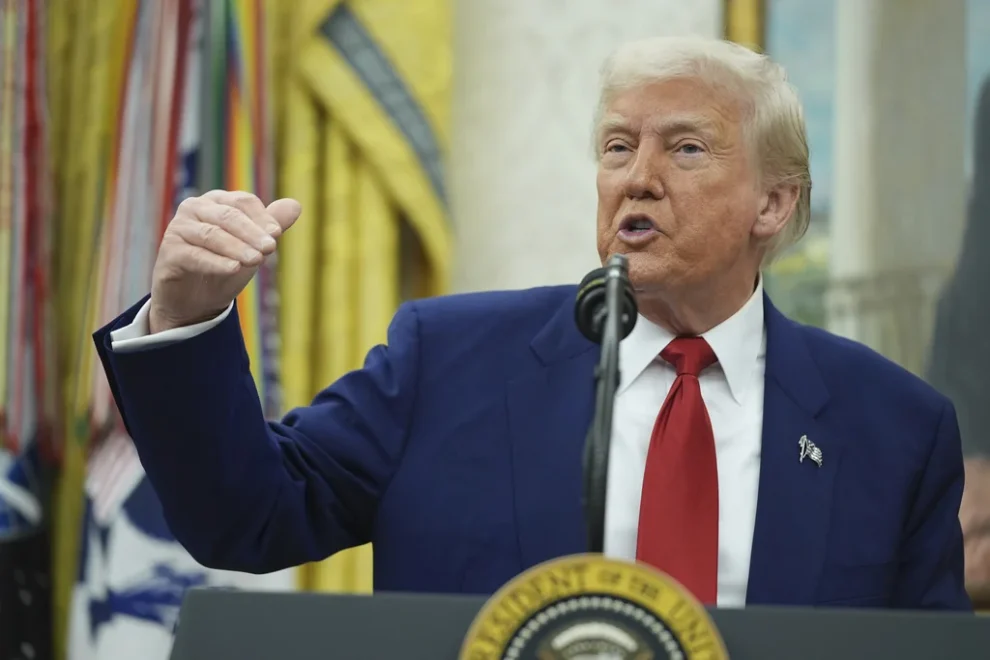President Donald Trump is betting he can bring public opinion to his side in a winding legal fight with Harvard, the elite university that, more than any other, has resisted his sweeping policy demands.
Harvard has sued the Trump administration twice for actions it says amount to a “campaign of retribution.” Its president, Alan Garber, has said the school ought to improve viewpoint diversity and its response to campus protests – two areas the Trump administration is demanding be addressed.
But Harvard has also challenged the withering set of penalties Trump has been quick to impose, refusing to cooperate in the name of academic independence. In April, Harvard challenged Trump’s freeze on billions in federal funding, a sum that expanded Tuesday to include some $100 million in contracts across the government.
Trump has separately moved to revoke its tax-exempt status and last week invited a second legal challenge from Harvard over his decision to block foreign students from enrolling.
“Look, Harvard has been a disaster,” Trump said Wednesday at the swearing-in ceremony of U.S. Attorney Jeanine Pirro, accusing the administrators of being “totally antisemitic” over their handling of last year’s Gaza demonstrations.
“It’s been exposed, very exposed, and I think they’re dealing very badly. Every time they fight, they lose another $250 million. Yesterday, we found another $100 million,” Trump added, suggesting the United States was padding Harvard’s $53 billion endowment.

A TIMELINE OF THE TRUMP-HARVARD SAGA
Public polling shows a polarized but slightly negative response to Trump’s strong-arm approach. A little more than half of adults, 56%, disapprove of the administration’s handling of college education, according to an Associated Press/NORC survey, though a large share is undecided on Trump’s specific tactics.
A plurality, 45%, were against the administration freezing funds to achieve its policy goals, with 27% of those surveyed supportive. Thirty-six percent oppose revoking universities’ tax status, compared to 30% in favor.
Harvard, too, has a reputation to defend as voters express waning confidence in higher education. Universities are still reeling from the campus protests that spawned a wave of harassment against Jewish students, while questions of affordability and political bias have increasingly weighed down public support, especially among Republicans.
In 2024, a third of adults polled by Gallup had very little or no confidence in higher education, up from 10% a decade earlier.
Singling out Harvard
Other colleges have largely eschewed a direct confrontation with Trump, with Columbia most visibly caving to the administration’s demands. In response to $400 million in funding cuts, the university agreed to revamp its campus protest policies and place its Middle Eastern studies department under new oversight, among other reforms.
But Harvard’s refusal to comply has given Trump a fight with both legal and political dimensions. As the lawsuits wind through the courts, Harvard’s status as an Ivy League school has allowed Trump to reinforce the perception that it caters to an out-of-touch elite.
This week, he threatened to shift $3 billion in grants to trade schools he said “badly needed” the investment.
“Harvard’s not exactly a sympathetic figure,” said GOP strategist John Feehery. “It’s not like they do a particularly good job of marketing themselves to normal Americans. They hold themselves out as being, you know, the elite of the elite.”
More frequently, the president has portrayed the university as a hotbed for antisemitism, using instances of anti-Israel sentiment to target a larger body of student visa holders.
The administration has so far revoked hundreds of student visas nationwide, in some cases due to pro-Palestinian activism.
“Harvard has to show us their lists. They have foreign students, about 31% of their students are foreign-based,” Trump said on Wednesday, at one point floating a cap of 15% on foreign enrollment.
“If somebody is coming from a certain country and they’re 100% fine, which I hope most of them are, but many of them won’t be – you’re going to see some very radical people,” he added.

Harvard has called the Trump administration’s actions “unwarranted,” signaling that it will only cooperate with the Department of Homeland Security, which is seeking the disciplinary records of student visa holders, as “required by law.”
More broadly, it has galvanized some level of academic resistance, inspiring hundreds of university officials to sign an April letter to “speak with one voice against the unprecedented government overreach and political interference now endangering American higher education.”
Democrats in a Harvard bind
In Washington, the response to Trump’s actions has fallen largely along party lines. To Republicans, Trump’s executive orders fit neatly into past congressional scrutiny of Harvard’s campus policies.
In the last Congress, House Republicans hauled the presidents of elite universities before their committees for a blockbuster hearing on campus antisemitism that contributed to a wave of resignations.
Several ultimately stepped down following their testimony before Congress, including Harvard’s Claudine Gay, who apologized for lawyerly answers that sidestepped how protesters calling for genocide should be disciplined.
“Harvard neglected its responsibility to protect American students and national security, and now President @realdonaldtrump is rightfully stepping in to hold them accountable,” Rep. Elise Stefanik (R-NY) posted on X in response to Trump revoking Harvard’s student visa program.
“This bold action is a necessary step to restore order, safety, and academic excellence at Harvard,” she added.
Stefanik, who is now running for governor of New York, raised her national profile with combative exchanges at those congressional hearings.

Democrats, meanwhile, have attempted to straddle the line between supporting Jewish students and scrutinizing the overreach alleged by universities. Earlier this month, Senate Minority Leader Chuck Schumer (D-NY) called for an investigation into Trump stripping Harvard of its tax-exempt status, writing to the Treasury Department inspector general shortly before the revocation was announced.
“The Trump administration is making unprecedented demands of universities aimed at undermining or even destroying these vital institutions,” Schumer said in a separate April statement.
“Universities must do more to fight antisemitism on campus, but the administration should not use it as an excuse for a broad and extra-legal attack on these institutions,” he added. “Harvard is right to resist.”
The balancing act reflects the ways in which Republicans have used campus antisemitism as a political wedge, while Democrats are also sensitive to Trump’s populist appeals.
After losing ground to Republicans with working-class voters in successive elections, Democrats have begun to recalibrate their message, leaning into patriotic themes and rejecting “coded” language used by the Left.
“Trump’s trying to force us into a corner. We can’t let him do that,” said Democratic strategist Brad Bannon.
Bannon’s prescription to reengage the working class is to make the economy Democrats’ “bread and butter,” emphasizing the early tariff chaos of Trump’s second term.
“The bread and butter is the issue. The price of butter, the price of eggs,” he said.
The political danger for Trump is that he will alienate a segment of suburban swing voters who once reliably supported Republicans. His actions include widespread cuts to grants that support public health research on tuberculosis, Lou Gehrig’s disease, and more, according to Harvard Magazine.
The Associated Press poll found that 62% of adults support maintaining funding levels for medical research, including 57% of Republicans.
But Trump’s tactics also resonate with the conservatives who see the feud as a finger in the eye of Harvard after years of perceived marginalization.
“This idea that we can lecture these elites finally on something is kind of politically very salient,” Feehery said.
“It’s kind of akin to Andrew Jackson taking down the National Bank,” he added. “You know, it’s just an easy target.”
Republicans, facing historical headwinds as the party in power, could have trouble driving out their base in the midterm elections, but Trump surprised political spectators by winning in November with a message that largely ignored appeals to the middle.
Legal fights ahead
In the courts, Trump faced a temporary setback last week after a federal judge paused his ban on Harvard’s student visas, with a preliminary hearing set for Thursday to decide on an extension. The same judge, based in Boston, has agreed to expedited proceedings for Harvard’s earlier lawsuit, scheduling oral arguments for July 21.
An unfavorable ruling – Judge Allison Burroughs, an Obama appointee, repeatedly sided against Trump in his first term – could mean a protracted legal battle that eventually makes its way to the Supreme Court.
Three judges have thrown out Trump’s executive orders targeting Democratic-aligned law firms, and the Justice Department has yet to appeal those rulings.
The Supreme Court is separately expected to rule on Trump’s efforts to slash the size of government, including the mass layoffs orchestrated under his Department of Government Efficiency.
CAN TRUMP WIN HIS LEGAL BATTLE AGAINST HARVARD?
In Congress, Republicans have complemented Trump’s war on Harvard by targeting the endowments of major universities. As part of the “big, beautiful bill” that passed the House last week, lawmakers included a provision charging a higher tax on endowment investment income.
That provision is projected to cost Harvard alone $850 million a year should it become law.
























